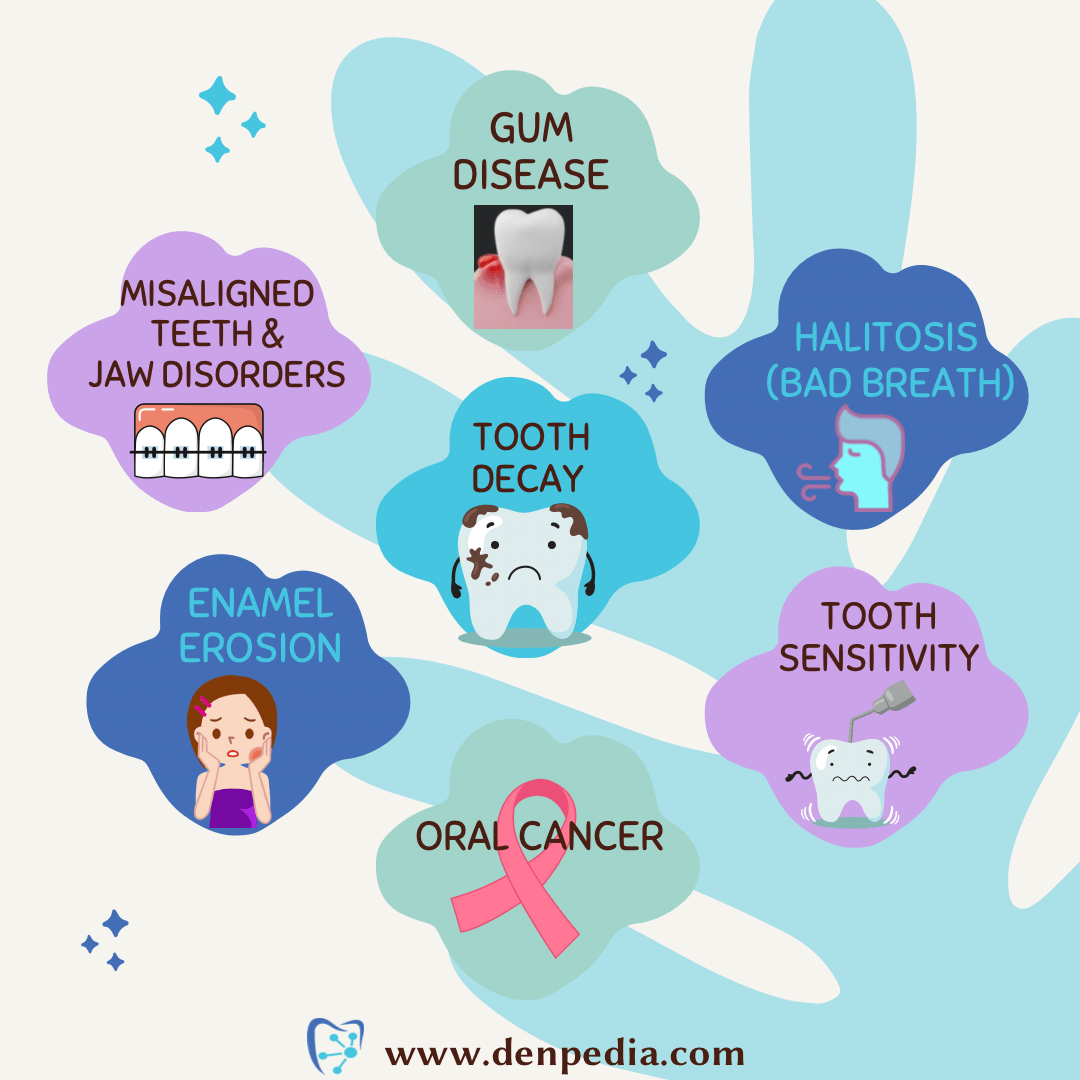Oral habits play a significant role in maintaining good oral health. However, certain habits can be detrimental to dental well-being and lead to a host of issues affecting the teeth, gums, and overall oral cavity. In this comprehensive article, we will delve into various bad oral habits, their impact on dental health, and explore preventive measures to mitigate their adverse effects.
Table of Contents
ToggleBad Oral Habits
Bad oral habits are practices or behaviors that, when repeated over time, can have harmful effects on oral health. These habits often stem from lifestyle choices, environmental factors, or personal inclinations. The consequences of bad oral habits can range from minor issues like bad breath to severe dental problems such as gum disease and tooth decay.
Common Bad Oral Habits
- Poor Oral Hygiene Practices
- Excessive Sugar Consumption
- Tobacco Use
- Bruxism (Teeth Grinding)
- Nail Biting
- Using Teeth as Tools
- Consuming Acidic Foods and Drinks
- Thumb Sucking
- Tongue Thrusting
- Teeth Clenching
Poor Oral Hygiene Practices
Neglecting regular oral hygiene practices such as brushing, flossing, and regular dental check-ups is a fundamental bad oral habit. Inadequate cleaning allows plaque and bacteria to accumulate, leading to cavities, gum disease, and other complications.
Excessive Sugar Consumption
A high intake of sugary foods and beverages is a detrimental oral habit. Sugar promotes the growth of harmful bacteria in the mouth, which produce acids that erode tooth enamel, causing cavities and decay.
Tobacco Use
Smoking and chewing tobacco are notorious for causing severe oral health issues. They can lead to stained teeth, gum disease, tooth loss, and significantly increase the risk of oral cancers.
Bruxism (Teeth Grinding)
Grinding the teeth, often unknowingly during sleep, is another bad oral habit. Bruxism can cause tooth wear, fractures, headaches, and jaw pain, ultimately leading to various dental problems.
Nail Biting
Nail biting is a common habit that can harm the teeth and gums. It can cause chipping and misalignment of teeth and introduce harmful bacteria from the fingers into the mouth.
Using Teeth as Tools
Using teeth to open bottles, tear packages, or perform other non-eating activities is a damaging habit. It can lead to fractures, chips, or even dislocations of teeth.
Consuming Acidic Foods and Drinks
Regular consumption of acidic foods and beverages can erode tooth enamel, making the teeth more susceptible to cavities and sensitivity.
Thumb Sucking
Thumb sucking is a common oral habit, especially among children. While it provides comfort to young children, prolonged thumb sucking can cause dental problems if it persists beyond the primary teeth stage. The continuous pressure and suction from thumb sucking can lead to misalignment of the teeth, changes in the roof of the mouth, and altered jaw growth. Orthodontic intervention may be required to correct these issues if the habit continues into the permanent teeth phase. Encouragement and positive reinforcement can be helpful in breaking this habit in children.
Tongue Thrusting
Tongue thrusting, also known as orofacial muscular imbalance, is an oral habit where the tongue presses against or thrusts through the teeth during swallowing, speaking, or at rest. This habit can lead to malocclusion (misaligned teeth), speech problems, and difficulties in chewing and swallowing. A comprehensive evaluation by a dentist or orthodontist is essential to determine the severity of the tongue thrusting habit. Treatment may involve myofunctional therapy to retrain the tongue muscles and potentially orthodontic treatment to correct any resultant dental issues.
Teeth Clenching
Teeth clenching, is a habitual grinding or clenching of the teeth, often occurring unconsciously during sleep. Clenching can cause significant dental problems, including tooth wear, fractures, jaw pain, headaches, and muscle tension. Stress and anxiety are common triggers for clenching. Using a custom-fitted mouthguard, often prescribed by a dentist, can help protect the teeth from the effects of clenching. Stress management techniques, relaxation exercises, and addressing underlying emotional factors can also aid in reducing teeth clenching.
The Adverse Effects of Bad Oral Habits
- Tooth Decay (Cavities)
- Gum Disease (Periodontal Disease)
- Halitosis (Bad Breath)
- Tooth Sensitivity
- Oral Cancer
- Enamel Erosion
- Misaligned Teeth
- Jaw Disorders
Tooth Decay (Cavities)
Inadequate oral hygiene and excessive sugar consumption create an environment conducive to tooth decay. The bacteria in the mouth feed on sugars, producing acids that corrode tooth enamel, leading to cavities.
Gum Disease (Periodontal Disease)
Bad oral hygiene, tobacco use, and certain habits like teeth clenching can cause gum disease. Plaque buildup leads to inflammation of the gums, which, if left untreated, can progress to periodontitis, involving bone loss and potential tooth loss.
Halitosis (Bad Breath)
Poor oral hygiene and certain habits contribute to bad breath. The accumulation of food particles and bacteria in the mouth results in unpleasant odors.
Tooth Sensitivity
Abrasive habits, including aggressive brushing and consuming acidic foods, can cause tooth sensitivity. The loss of enamel exposes the sensitive inner layers of the teeth (dentin), leading to discomfort.
Oral Cancer
Tobacco use, including smoking and chewing tobacco, is a major risk factor for oral cancer. It affects the lips, tongue, cheeks, and throat. Early detection and cessation of the habit are crucial for prevention and effective treatment.
Enamel Erosion
Regular consumption of acidic foods and beverages weakens tooth enamel, making it more susceptible to erosion. This can lead to thinning and weakening of the teeth.
Misaligned Teeth
Habits like thumb sucking and nail biting, especially during developmental years, can cause misalignment of teeth and jaws. This can lead to difficulty in chewing, speech issues, and aesthetic concerns.
Jaw Disorders
Teeth clenching and grinding can lead to temporomandibular joint (TMJ) disorders, causing jaw pain, headaches, and difficulty in opening and closing the mouth.
Preventing and Breaking Bad Oral Habits
- Educational Campaigns and Awareness
- Regular Dental Check-ups
- Behavioral Therapy
- Replacement Strategies
- Counseling and Support Groups
- Orthodontic Treatment
Educational Campaigns and Awareness
Raising awareness about the adverse effects of bad oral habits through educational campaigns is essential. Information about the risks and consequences can motivate individuals to make positive changes in their habits.
Regular Dental Check-ups
Regular dental visits enable early detection of dental issues and provide guidance on breaking bad oral habits. Dentists can also educate individuals about proper oral hygiene practices.
Behavioral Therapy
For habits like teeth clenching, behavioral therapy and stress management techniques can help individuals identify triggers and develop coping strategies to break the habit.
Replacement Strategies
For habits like nail biting, providing alternative activities or tools to keep hands and mouth occupied can help individuals break the habit.
Counseling and Support Groups
For habits like tobacco use, counseling and support groups can play a pivotal role in helping individuals quit. Providing a supportive environment and access to resources can aid in successful habit cessation.
Orthodontic Treatment
For habits causing misalignment, orthodontic treatment can be beneficial. This may include braces, retainers, or other devices to correct the positioning of the teeth and jaws.
Conclusion
Bad oral habits have far-reaching consequences on oral health and overall well-being. Understanding the risks associated with these habits and taking proactive steps to prevent or break them is crucial for maintaining a healthy mouth. By promoting education, regular dental check-ups, and implementing effective preventive strategies, individuals can mitigate the adverse effects of bad oral habits and embrace practices that contribute to a lifetime of excellent oral health. Breaking these habits and adopting positive oral hygiene practices are essential steps towards achieving a beautiful smile and optimal oral well-being.


